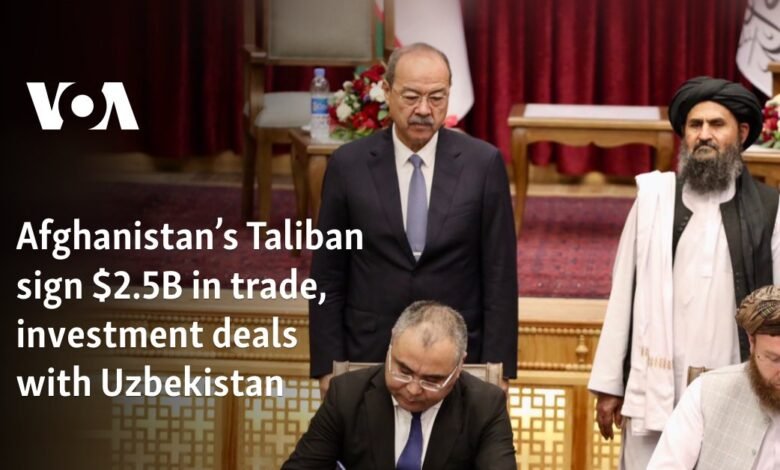Afghanistan’s Taliban sign $2.5B in trade, investment deals with Uzbekistan

The Taliban government in Afghanistan announced Saturday that it had finalized trade and investment deals worth $2.5 billion with the prime minister of neighboring Uzbekistan during his historic visit to Kabul.
Uzbek Prime Minister Abdulla Aripov and his delegation arrived in the Afghan capital on the highest-level visit by a foreign leader to the country since the Islamist Taliban regained control three years ago. Aripov was accompanied by Laziz Kudratov, the minister of investment, industry, and trade, among other senior officials.
Aripov and Mullah Abdul Ghani Baradar, the deputy Taliban prime minister for economic affairs, oversaw the signing of “35 MoUs (memorandums of understanding) valued at $2.5 billion.” The ceremony occurred after the two leaders inaugurated an exhibition of Uzbek products in Kabul.
“The MoUs include 12 investment agreements valued at $1.4 billion and 23 trade agreements worth $1.1 billion,” Baradar’s office said in a statement. The documents covered agriculture, energy, infrastructure, and manufacturing sectors.
“This landmark signing is a testament to the strong political will and commitment of the leadership in both Afghanistan and Uzbekistan to deepen economic integration in the region,” Taliban-run Afghan state media quoted Baradar as saying. “We are confident that these agreements will create new avenues for investment, trade, and job creation, benefiting the people of both our nations,” he added.
Afghan media quoted Uzbek minister Kudratov as saying that the two countries are working together to increase the annual bilateral trade to $3 billion.
Afghanistan shares a 144-kilometer (89.4 miles) border with Uzbekistan, and both sides have reported a steady improvement in bilateral political, security, and economic cooperation since the Taliban takeover.
The fundamentalist group swept back to power in Kabul in August 2021 as the United States and NATO troops withdrew from the country after 20 years of war with the then-insurgent Taliban.
No country has formally recognized the Taliban as the legitimate government of Afghanistan, and international development assistance to the impoverished country remains suspended.
Terrorism-related global sanctions on many top Taliban leaders, isolation of their administration, and termination of foreign development aid have made it difficult for the de facto Afghan government to tackle the country’s deepening economic troubles.
The World Bank reported in April that the aftermath of the Taliban takeover had seen a stark decline in international aid, leaving Afghanistan without any internal growth engines and leading to “a staggering 26% contraction in real GDP.”
However, the Taliban’s policies, in line with their strict interpretation of Islamic law, have troubled the world because they have barred Afghan girls from attending school beyond the sixth grade and many women from public and private sector employment.
The Taliban reject criticism of their government as interference in internal matters of Afghanistan, saying their policies are aligned with local culture and Islam.
Source link





